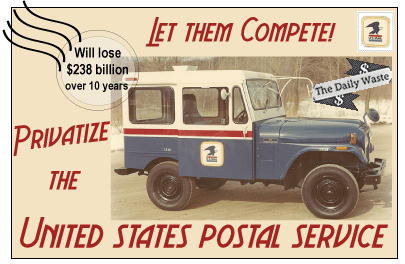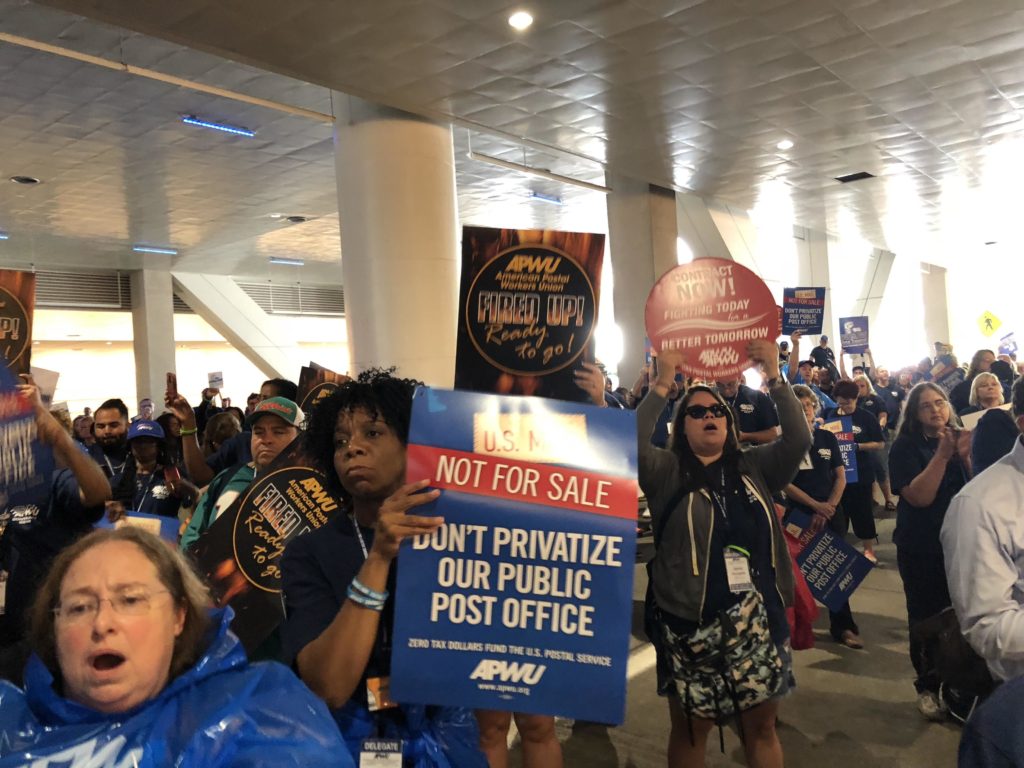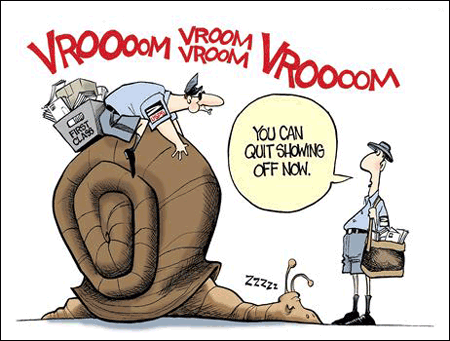Proposal Would Let Postal Service Sell Access To Your Mailbox (#GotBitcoin?)

Government report suggests raising revenue by letting companies make direct deliveries, for a fee. Proposal Would Let Postal Service Sell Access To Your Mailbox (#GotBitcoin?)
U.S. Proposal Would Let Postal Service Sell Access To Your Mailbox
Looking for ways to raise Postal Service revenue, the Trump administration has proposed a fundamental change to your mailbox: selling access to it to private companies.
The Postal Service could capitalize on a “highly valuable” asset by selling mailbox access to companies such as FedEx Corp. and United Parcel Service Inc., the administration said in a report last week.
The Postal Service has been losing money for years as letter volume has declined and it has struggled with requirements that it fund retirement benefits decades in advance. It reported a net loss of $3.9 billion in the fiscal year ended Sept. 30.
Past proposals to boost revenue have ranged from privatization to the introduction of banking services—ideas last week’s report didn’t endorse. The report was commissioned in April by President Trump, who has regularly claimed that Amazon.com Inc. gets a sweetheart deal on package shipping from the Postal Service. It drew immediate attention for another proposal, tiered pricing for packages, which would likely raise shipping prices for e-commerce.
The proposal to license access to mailboxes was one of the ideas for using existing assets to find new revenue.
It is illegal for anyone except a Postal Service mail carrier to deliver to a mailbox, a restriction established in 1934 to crack down on attempts to avoid paying postage. Such limited access protects customers from theft and preserves their privacy, last week’s report noted.
Technically, even dropping a card in your neighbor’s mailbox is a federal crime. Commercial shippers instead walk up to a customer’s door, sometimes leaving a package on a porch or outside a locked apartment building.
The report notes that revenue could be raised by retaining the mailbox monopoly but allowing regulated access, for a fee, to certified private companies. These “franchisees” would be granted access to the mailbox for the delivery of mail and small parcels, according to the report.

“They would be willing to pay a fair amount to have access to that capability,” a senior administration official said in a call with reporters.
The report doesn’t go into details about what these licensing deals might look like, such as whether it would mean that private companies would get access to locked mailboxes, or those inside apartment buildings.
Postal unions argue the proposal would essentially privatize a part of the Postal Service that has been considered a government service, something “that obviously affects our mission and our jobs,” said Mark Dimondstein, president of the American Postal Workers Union.
He also said expanding access beyond postal workers could require residents to give up a certain amount of privacy. “I don’t think the customers would take kindly to anybody being able to open that mailbox and put something else in there,” Mr. Dimondstein said.
The head of the Postal Regulatory Commission, which approves any new Postal Service products, said it would be a major shift.

“We’re unique, where no one else can put their hand in your mailbox except the Postal Service,” Chairman Robert Taub said. “This would be a change to how that has been handled for 84 years. That would be a big deal.”
But given the Postal Service’s dismal finances, Mr. Taub said everything should be considered.
It’s unclear how popular mailbox licenses would be, given that many commercial shippers already pay the Postal Service for what’s called “last-mile” delivery of many packages. Because the Postal Service already delivers to every mailbox nationwide, it is often cheaper for these companies to contract with them than to deliver items themselves.
But mailbox access could save time when commercial shippers deliver packages themselves, said Chris Wetherbee, a transportation analyst at Citi Research.
“That could just take some of the intensity out of the stopping, walking up driveways, dropping stuff on the front step,” Mr. Wetherbee said.
A spokesman for FedEx declined to comment. UPS spokeswoman Kara Ross called the report as a whole “a positive step to address the challenges the USPS faces” but declined to comment directly on mailbox licensing.
The senior administration official said that some forms of e-commerce could be considered essential. “There would need to be some mechanism of identifying the type of package it is, but the actual contents or the privacy of the contents would not be something that the Postal Service would need to know,” the official said.
Meanwhile, details are uncertain about the report’s proposal to charge higher prices for commercial packages that aren’t deemed essential services. The report cited pharmaceuticals as one possible example of essential packages, but it didn’t otherwise say how a package’s category would be determined.
Updated: 5-20-2020
USPS Needs Fixing. Wall Street Has a Plan
The U.S. Postal Service needs fixing . And Bernstein analyst David Vernon has some ideas. He published a road map for change in a Wednesday research report. Investors should pay attention.
For starters, Covid-19 could be a catalyst for change. And any changes will have big implications for FedEx and United Parcel Service, as well as companies trying to increase e-commerce volumes , including Amazon.com.
The Covid-19 pandemic has hurt many companies. The postal service is no exception. Advertising-mail volumes have plummeted, creating a cash crisis. And despite falling sales, the USPS is still working every day, delivering mail, stimulus checks and packages to cooped-up Americans.
Congress has provided some support for the Postal Service in recent stimulus packages. But the aid is up to the discretion of Treasury Secretary Steven Mnuchin and it isn’t clear whether the money to help has arrived yet. The Treasury Department and the USPS didn’t respond to a request for comment.
The aid is only a stopgap. Vernon has three bigger ideas to put the Postal Service on a more-sustainable path. He suggests raising the price of a stamp, raising the price to mail parcels and reducing service.
Congress, ultimately, sets stamp prices. The USPS can’t do it without permission. In fact, stamp prices came down in 2016. But Vernon’s point is the USPS is a monopoly, so even if prices rise people will still send mail. Advertisers, however, would howl at cost inflation.
Raising parcel prices is something President Donald Trump has suggested . But raising prices chokes off demand in a competitive market, something Vernon admits is likely.
Still, he thinks there are opportunities for higher pricing, partly because parcel pricing, and parcel shipping, are complicated. The USPS works with many publicly traded companies to label and deliver packages to a local post office for last-mile delivery . Companies, such as UPS (ticker: UPS) can often get packages across the country cheaper than the USPS can. Freight consolidation, as it is called, is one example of how the industry competes and works together.
Finally, Veron suggests that the Postal Service deliver mail every other day. Productivity rises: same mail, fewer trips. The problem with that idea, of course, is workers. That effectively means fewer hours for the same number of packages—a difficult pill to swallow.
Change may be coming, but the whole idea of business sustainability has been a sore spot for Postal Service insiders for a while. It is worth pointing out that in some respects the post office is already sustainable. At least before Covid-19 hit.
It is true the Postal Service has reported losses in recent quarters. But its earnings are complicated. The USPS has larger-than-average benefit obligations, which are impacted by interest rates. That means quarterly profit swings are often noncash earnings charges, dictated by rising or falling rates. The USPS produced positive free cash flow in 2017, 2018 and 2019.
What’s more, mail volumes are falling, putting pressure on profit. But parcel volumes are growing, helping profitability. The post office doesn’t break out profit by type of shipment.
The odds of change happening are probably higher than in the past because of the pandemic crisis. Also, Louis DeJoy is set to become the next postmaster general, succeeding Megan Brennan. He comes from the private sector and sold one of his businesses to XPO Logistics (XPO).
The implications of change for FedEx (FDX) and UPS are murky. The simplest way to think about it is that higher parcel rates are good for shipping companies and bad for shippers.
That dynamic might be evident in a small way in Wednesday trading. Investors might have heard Vernon. FedEx shares were up 3.8% late morning, outpacing the S&P 500’s 1.7% rise and the Dow Jones Industrial Average’s 1.6% gain. UPS stock was up 1.4%.
U.S. Proposal Would Let,U.S. Proposal Would Let,U.S. Proposal Would Let,U.S. Proposal Would Let,U.S. Proposal Would Let,U.S. Proposal Would Let,U.S. Proposal Would Let,U.S. Proposal Would Let,U.S. Proposal Would Let,U.S. Proposal Would Let,U.S. Proposal Would Let,U.S. Proposal Would Let,U.S. Proposal Would Let,U.S. Proposal Would Let,U.S. Proposal Would Let,U.S. Proposal Would Let,U.S. Proposal Would Let,U.S. Proposal Would Let,U.S. Proposal Would Let,U.S. Proposal Would Let,U.S. Proposal Would Let,
Go back

Leave a Reply
You must be logged in to post a comment.